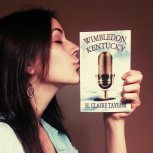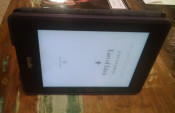How I Learned to Stop Worrying and Love the eBook
 As an indie author, there’s really nothing more magical than holding a hard copy of my book in my hand for the first time.
As an indie author, there’s really nothing more magical than holding a hard copy of my book in my hand for the first time.
I imagine holding your child in your arms for the first time might feel similarly invigorating, but books don’t ruin your social life for eighteen years and then bankrupt you because they want to attend NYU (or literally any four-year university at this point) but didn’t bother applying for scholarships.
Anyway, books are awesome. There’s a tactile experience that you get from reading a book that is unique and gratifying. Nothing like being able to feel the gradual shift in weight from your right hand to your left over a period of hours as you burn through one page after another. And then there’s the smell. Mmm…
But here’s the thing.
The rate of Americans who read even one book a year is steadily declining. I know plenty of people who want to read more, and I genuinely believe that they mean it. There’s usually this sad look in their eyes when they say, “I should read more books.” It’s the same look they have when they lament how long it’s been since they spoke with an old friend or binge-watched Firefly. So why don’t people read more? They clearly want to. What’s stopping them? Duh. Netflix. The Internet. The insane cost of buying a new book. The health risks associated with stepping foot in a library (I’m not a fan). The list goes on. Now if only there was a way around some of those things…
Enter eBooks. I still can’t believe how many friends I have who pride themselves on being well read but get all elitist and look at me like I’ve lost my mind when I suggest they get an eReader.

Dramatization by Senga.
I get it. I was there too. For all the reasons mentioned above, I had a love affair with hard copies of books (and still do). But I thought I’d try a Kindle Paperwhite, and you know what happened? I read ten books in the first month and a half. That was more than I’d read the previous year. I even finished East of Eden—now one of my favorite books ever—which I’d stopped reading—seriously—because it was so big and unwieldy, and with my neck and back pain, I prefer to read lying down.

Voila! Hands-free.
You don’t need to have back pain, weak arms, and a big-ass book to benefit from the eBook revolution, though. Here are the main reasons why I suggest you get over your bias and just give in:
You’ll read more. I think this is the noblest reason of all. We all know reading makes you more knowledgeable, more empathetic, helps improve memory, and so forth. Those are all great things. Why not try something new if it means gaining all these benefits?
You’ll save money. Sure, if you want to buy an eReader, there’s an up-front cost (although Kobo now sells one for only $39.99). But if you already have a tablet or smartphone, guess what? You have an eReader. Kindle has a free app you can download that allows you to read anything from their humongous selection of books. They even have Kindle Unlimited, where you pay a monthly fee comparable to a Netflix or Spotify subscription and have access to all kinds of books that are enrolled in the program. Then there’s the added benefit of eBooks being really freaking cheap. Most indie authors sell their books for no more than $4.99 a piece, but no matter what book your buying, the eBook version is always cheaper than the physical copy.
You can have access to books instantly. Listen, I love going to Barnes & Noble as much as the next gal. I love the feel of bookstores so much I used to work at one in college. You can still enjoy that experience when you want, but when you don’t want, you don’t have to. You can sit at home, browse B&N or Goodreads or Amazon or Kobo, find something you like, download it, then read it right away without even having to put on pants.
The book is changing. Did you know authors love Facebook and YouTube and other things that require more flash and less time to consume? This means that the structure of the book is changing, at least in the indie realm. Like any old, oligarchical industry, traditional publishing takes a while to shift to meet the demands of the reader. If a writer gets a literary agent and if their book is picked up by a traditional publisher, it could be months if not years before the work sees the light of day. Meanwhile, indie eBook publishers can feel out the market, adapt the form to fit the consumer’s desires and produce a product in almost no time at all. One of the cool results of this is that books are being marketed more like other forms of entertainment. In a time where there is so much entertainment available, consumers are defaulting to the economics of dependability, meaning people like to know they’ll enjoy something before they’re willing to commit their hard-earned money to it (think film remakes and films based off popular books). The result of this consumer expectation is that TV shows have become where it’s at lately because viewers are willing to spend thirty minutes or an hour on something they’re not certain they’ll enjoy because the risk is so low. If the pilot episode sucks, you move on with only a little time out of your life wasted, but if you like it, you now have a whole wealth of viewing pleasure to look forward to. Self-publishers are noticing that, and when there’s no printing cost and the time it takes to format a book and release it for print is dramatically shorter, authors can now afford to structure books like television, and so they do. The first book in a series is often free or discounted so that readers can decide if they like it with little to no risk, and as the author doesn’t incur printing costs, they and can afford to do that. And if the first few books of the series take off, the author can focus more time on that series to meet the demand. But that structure just isn’t possible with hard copies, and the traditional publishing industry is late to the game on that technique, even though it benefits both writers and, most importantly, readers.
Access your books anywhere. I have a Kindle, and I have the Kindle app on my phone. I may not bring my Kindle everywhere, but I always have my phone on me, so I can read wherever I go. I imagine most people keep their smartphones on them at all times. So that means when you’re meeting friends at a restaurant or bar and they all decide to run late, leaving you to hold down the table for an unspecified amount of time, you can whip out your phone, open up the Kindle app, and pick up reading right where you left off. Now think about it. When your friends show up half an hour later than they said they would, which would put you in a better mood: knowing you spent the time wisely and productively having read a book you love, or feeling that they’ve wasted your time by leaving you alone with nothing to do besides scrolling mindlessly on Facebook, Twitter, or (god forbid) Tinder?
There are amazing titles that are only available as eBooks. Here it is: the self-promotion. I’m releasing my newest book, A Single’s Guide to Texas Roadways, on Valentine’s Day this year, but only as an eBook. Why? Basically because it’s cheaper, easier, and faster, meaning I can move on to other projects I think my readers will like. I’m not alone in this. Hard copies are becoming an afterthought for most indie writers. The common stigma surrounding self-publishing is that the quality of product is inferior to traditional publishing. That might have been true five or ten years ago, but I can tell you that it’s not necessarily true today. Sure, there are some terrible writers who self-publish, but there are easy ways to spot a good book, like positive reviews, seeing it featured on email lists or websites, and of course, good old-fashioned word of mouth. Don’t be scared of indie writers, is what I’m saying. That fear could keep you from finding your next favorite author, and with the financial stakes so low with eBooks, you really don’t have much to lose by trying new things.
You are guaranteed to find something you like. Because bookstores have limited space, the books you can find there are the ones that will appeal to the widest audiences and make the store the most profit. But what if your tastes are more refined or specific? What if you really want to read intergalactic giraffe romcom, to the point where you’re like INTERGALACTIC GIRAFFE ROMCOM OR BUST! This is just an example. But the point is that if you have specific taste, you’re not likely to find a wealth of hard copy books that satisfy that. So then what happens is people start to mope around like, “I can’t find any books that I like,” or “I feel like I’ve read all the good books.” And then reading ceases to be a thing. But once you open yourself up to the world of eBooks, there’s almost an endless supply of whatever your weird niche happens to be. So then you keep reading and keep reading and keep reading.
Save space in your home. If one of your recent reads includes The Life-Changing Magic of Tidying Up, then I basically don’t need to say any more on this topic. But if you haven’t read that, think about this: You want to read fifty books a year. Does it make more sense to house those fifty books somewhere or does it make more sense to keep them all confined in a space the size of a copy of Of Mice and Men, which we all know you read in high school because it was literally the thinnest book you could find that the teacher allowed. “But what happens if my eReader breaks? I’ll lose all my books!” No, you won’t. It’s called the Internet. As long as you have your Amazon/B&N/Kobo account, your books are safe and can be downloaded to another device. To those of you who are okay with the cesspool that is a public library, I say great; this reason doesn’t apply to you. Have fun getting on a waiting list to read books that other people have most likely handled while taking a shit.
The authors you love get paid more. If you aren’t an asshole, this will matter to you. People work hard to produce the writing you love. If you want them to continue writing, they need your money. The beauty of eBooks is that they cost the writer nothing to publish, and the profit on each sale can be anywhere from 35-70%. That’s so much more than when printing costs, let alone agent and publisher costs, get involved. The incredible royalties and the lack of up-front costs (outside of editing and possibly cover design and formatting) are what allow so many talented writers to quit their day job and create the art you want to consume. Supporting that with your purchase is pretty freaking respectable.
Read things you’re not proud of. One word: erotica. Why do you think this genre is kicking ass lately? Because it’s now easier than ever to read it on the DL. Not into porn-y stuff? No problem (liar), but I’m sure there are books you’d like to read that you don’t necessarily want the world to know about. Consider self-help, cheesy YA, books you should have read by now, or literally anything by Dan Brown.
Get caught up on the classics for free. This one’s pretty simple. Kindle has a bunch of free books like Frankenstein, Dracula, Gulliver’s Travels, and Pride and Prejudice that you can download and read up on, allowing you to finally stop lying about having read them. You can buy the hard copies of those book for cheap, but they’re not free.
You can still buy hard copies. Love a book? Fine. Buy the hard copy. I still have physical copies of Harry Potter, Hitchhiker’s Guide, Dark Tower, The Princess Bride and so forth, because seeing those revs my engine. I’m not suggesting you Fahrenheit 451 all your hard copies. But you don’t have to keep ones you don’t care about.
Are you sold yet? If so, here’s what to do next:
Find the eReader that’s right for you!
Sign up for The Collective to be the first to know when I publish new eBooks.





